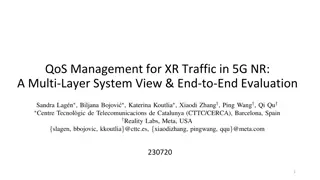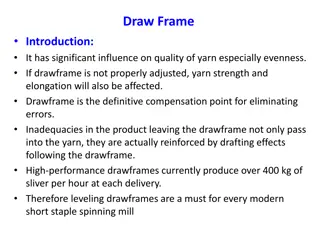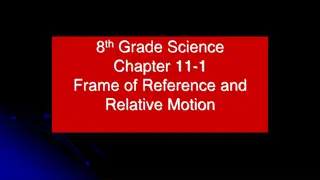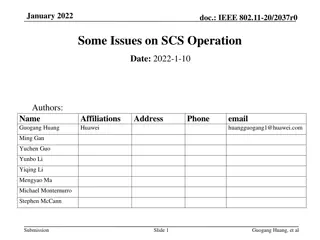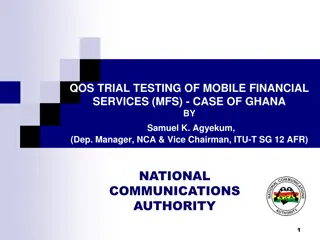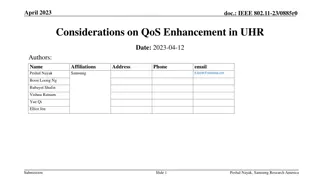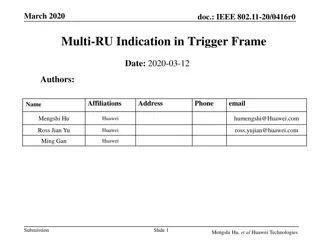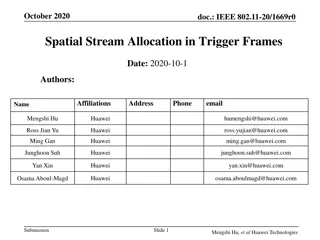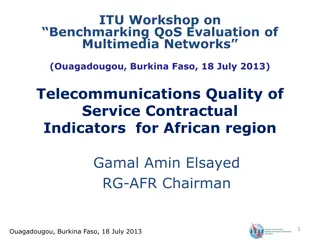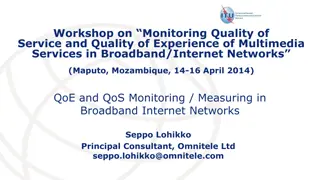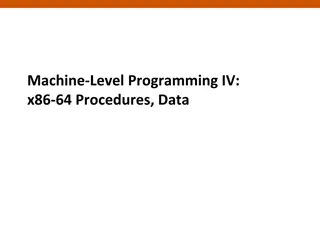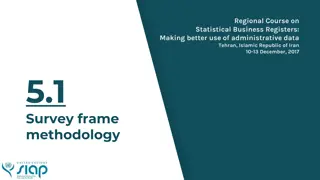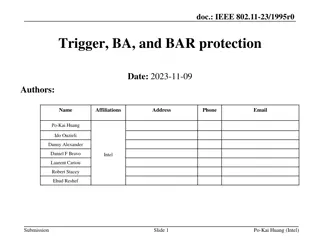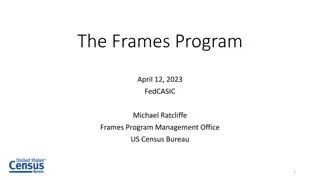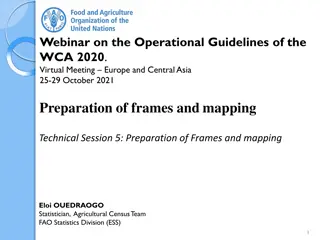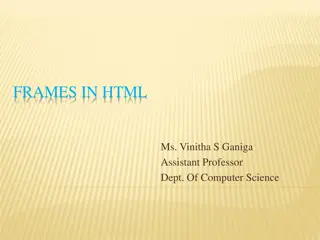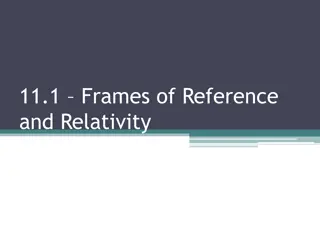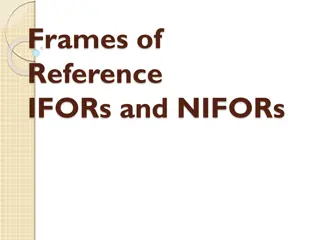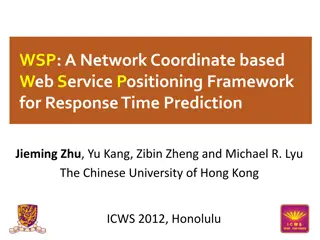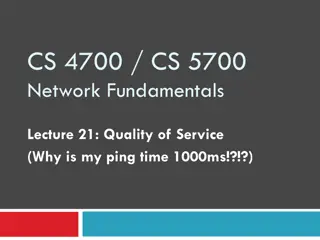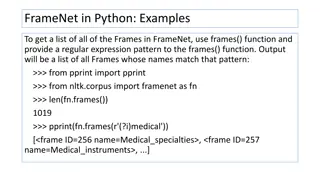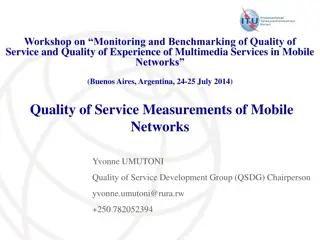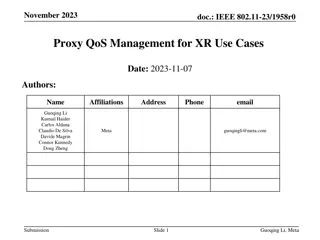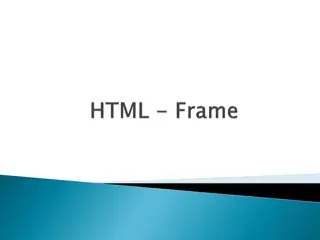5G NR Traffic QoS Management: Multi-Layer System View & End-to-End Evaluation
5G NR technology emphasizes enhanced QoS for XR traffic, including AR, VR, and Cloud Gaming. This research delves into handling QoS for XR/CG traffic at various layers, proposing QoS control mechanisms at the application and MAC layers, along with an evaluation of these approaches using a simulator.
6 views • 14 slides
Enhancing QoS Facility for Low-Latency High-Throughput Performance in IEEE 802.11 Networks
This proposal addresses the shortcomings in traffic classification and handling of uplink/downlink traffic in current IEEE 802.11 specifications, particularly in relation to low-latency traffic. It also highlights issues with the current EDCA mode in managing congestion and proposes high-level solut
5 views • 18 slides
Understanding Motion: Distance, Displacement, and Frames of Reference
This educational content delves into the concepts of motion, specifically distance, displacement, and frames of reference. It distinguishes between distance traveled and displacement, illustrating with examples of car journeys and runner movements. The importance of frames of reference in accurately
0 views • 45 slides
Stylish Frames Picture Frames Perfect for Any Decor
Turn your memories into breathtaking works of art with the exquisite picture frames of Jay Strongwater. Start shopping at jaystrongwater.com today and savor every moment.\n\n\/\/jaystrongwater.com\/collections\/frames
2 views • 1 slides
Understanding the Importance of Draw Frames in Spinning Mills
Draw frames play a crucial role in ensuring the quality and evenness of yarn in spinning mills. Proper adjustment of draw frames is essential for maintaining yarn strength and elongation. Historical inventions and advancements in draw frames have significantly improved their performance. The process
1 views • 50 slides
Understanding Motion: Frames of Reference and Relative Motion
Motion is defined as a change in position over time. To describe motion accurately, one needs to understand frames of reference and relative motion. Frames of reference are systems of objects used to determine if something is in motion, while relative motion involves movement in relation to a refere
3 views • 14 slides
Issues with SCS Operation in IEEE 802.11be Standard
The document discusses technical issues related to the SCS (Spatial Channel Sharing) operation in the IEEE 802.11be standard. It highlights inconsistencies in the standard regarding parameterized QoS requirements, mixing of traffic streams with different QoS needs, and challenges in prioritizing SCS
0 views • 15 slides
IEEE 802.11-21/1737r0 Beacon and Group Frames Information
An IEEE document from November 2021 discusses Beacon and group frames in wireless networks, focusing on out-of-band signaling to improve BSS range determination and frame reception by non-AP MLDs. It addresses the impact of frame types and MCS on BSS range and transmission rates, proposing solutions
3 views • 14 slides
IEEE 802.11-21/1737r0 Beacon and Group Frames Information
This document discusses the transmission of Beacon and group addressed frames in IEEE 802.11 networks, focusing on the impact of frame types and MCS on BSS range and transmission rate. It proposes out-of-band signaling to assist scanning STAs in determining BSS range and non-AP MLDs in selecting a l
0 views • 14 slides
Time Synchronization in Cloud Gaming Services
Cloud gaming services like AIS, TSCAI, and TSC Assistance Container play a crucial role in providing quality of service (QoS) to millions of users globally. The need for time synchronization in 5G networks, especially for industrial applications like AR/VR, is highlighted. Trusted AF entities can di
0 views • 4 slides
Enhancing Network Performance with RoCE Technology
Remote Direct Memory Access (RDMA) benefits, RoCEv2 packet format, resilient RoCE feature progression, optimizing network performance with QoS, and RoCE congestion control convergence analysis are discussed in this proposal. RoCE technology offers low latency, high throughput, and efficient CPU usag
0 views • 19 slides
Quality of Service (QoS) Trial Testing of Mobile Financial Services in Ghana
The National Communications Authority in Ghana conducted a QoS trial testing exercise on mobile financial services to assess compliance with QoS targets and consumer protection readiness. The test methodology involved using the SIGOS Integrated Test Environment system for billing verification on mob
5 views • 12 slides
Enhancing Quality of Service in Ultra High Rate Wi-Fi Networks
This document explores the potential improvements in Quality of Service (QoS) for Ultra High Rate (UHR) Wi-Fi networks, focusing on the benefits of timing information sharing for traffic urgency assessment. It discusses areas such as increased reliability, lower latencies, improved manageability, an
0 views • 11 slides
Layered QoS and Multi-Layer Transmission in IEEE 802.11-22 for Enhanced WLAN Performance
The document discusses the importance of layered Quality of Service (QoS) and multi-layer transmission in meeting the high throughput and real-time requirements of metaverse applications over WLAN. It emphasizes the need for enhanced throughput, reliability, reduced latency, and improved power effic
0 views • 11 slides
IEEE Std. 802.11-22/1017r0 Overview and Architecture Presentation
This presentation by Dorothy Stanley from HP Enterprise delves into the utilization of IEEE Std. 802.11-2020 standards focusing on the IEEE Std. 802 overview and architecture. It covers topics such as the use of LLC, MAC address formats, QoS mechanisms, MSDU formats, and various MAC services and pro
0 views • 10 slides
Multi-RU Indication in Trigger Frame for IEEE 802.11
This document discusses the concept of Multi-RU (Resource Unit) allocation in trigger frames for IEEE 802.11 standards, specifically focusing on the indication methods within trigger frames for improved spectral efficiency. The proposal suggests various options for indicating multiple RUs in trigger
0 views • 14 slides
Spatial Stream Allocation in IEEE 802.11-20 Trigger Frames
The document discusses spatial stream allocation in IEEE 802.11-20 trigger frames, specifically focusing on the SS Allocation subfield. It explains how trigger frames allocate resources for TB PPDU transmissions and solicit User Info fields, detailing the RU Allocation and SS Allocation subfields. T
3 views • 15 slides
Enhancing Contractual Parameters for Telecommunications Quality in Africa
Workshop in Ouagadougou focused on benchmarking QoS evaluation of multimedia networks, highlighting the importance of QoS, priority of contractual matters, inadequacy of E-803 for African region, and the role of regulators in customer rights. Suggestions included additional contractual parameters to
1 views • 18 slides
Enhancing Multimedia Services in Broadband Networks through QoE and QoS Monitoring
Explore the significance of Quality of Service (QoS) and Quality of Experience (QoE) monitoring in broadband internet networks, as discussed at a workshop in Maputo, Mozambique. Learn about Omnitele's approach to measuring end-user QoS and QoE, aiming to maximize customer experience and minimize net
0 views • 38 slides
Understanding x86-64 Procedures and Data Structures
This content provides insights into x86-64 programming, covering topics such as procedures, integer registers, stack frames, locals in the red zone, interesting features of stack frames, arrays, multi-dimensional structures, and more. It dives into the usage conventions of integer registers, the all
0 views • 44 slides
Understanding Sampling Frames in Statistical Business Registers
Sampling frames play a crucial role in surveys by providing a snapshot of statistical units needed for data collection. Key points include creating appropriate sampling frames, specifying target populations and variables of interest, and choosing the right statistical units based on the type of data
0 views • 20 slides
Enhancing Security for IEEE 802.11 Frames
Development and strategies for protecting crucial control frames in IEEE 802.11 networks, such as Trigger, BA, and BAR frames, to mitigate potential security attacks. Emphasizing the importance of Authentication for group-addressed control frames to maintain backward compatibility and ensure data in
0 views • 14 slides
Understanding Frame Strength in Public Policy Communication
Examining the strength of frames in public policy communication, focusing on the impact of thematic and episodic frames. Thematic frames emphasize general patterns and context, while episodic frames highlight specific events and stories to evoke emotional responses. The study delves into the 24-year
0 views • 17 slides
Understanding the Frames Program: A Detailed Overview
The Frames Program is a vital component of the US Census Bureau's modernized business ecosystem, aiming to create enterprise-wide frames that are linkable, agile, and adhere to best practices. These frames are organized around foundational units like Person, Business, Location, and Job. The Geospati
0 views • 11 slides
Operational Guidelines of the WCA 2020 Agricultural Census Frame Preparation
The webinar focuses on the preparation of frames and mapping for the Operational Guidelines of the WCA 2020 in the Europe and Central Asia region. It covers the definition of frames, types of frames, sources of information, guidelines for building frames, requirements for different census modalities
0 views • 33 slides
Understanding Inertial and Non-Inertial Frames of Reference
Frames of reference play a crucial role in describing and observing motion. In physics, there are two main types of frames of reference: inertial and non-inertial. An inertial frame is one that moves at a constant velocity, where Newton's first law holds true. Such frames have specific characteristi
0 views • 14 slides
Understanding Frames in HTML
Frames in HTML allow you to divide your browser window into multiple sections where each section can load a separate HTML document. Frames can be vertical, horizontal, or a mix of both, organized using the
Understanding Frames of Reference and Relativity
Explore the concept of frames of reference in physics, distinguishing between inertial and non-inertial frames. Learn about the laws of Newtonian mechanics, guidelines for inertial frames of reference, and delve into the intriguing realm of the Special Theory of Relativity with engaging visual aids
0 views • 35 slides
Scalable QoS Prediction for Service Adaptation in Service-Based Applications
This study delves into the challenge of predicting Quality of Service (QoS) for runtime service adaptation in service-based applications. It explores collaborative filtering and adaptive matrix factorization techniques for accurate QoS prediction, aiming towards enhancing service resilience and redu
0 views • 29 slides
Understanding Frames of Reference in Physics
Explore the concept of Frames of Reference (IFORs and NIFORs) in physics, including laws of motion, Inertial and Non-Inertial Frames, Fictitious Forces, and examples like the accelerometer in NIFOR. Learn how these concepts help explain motion and forces in different reference frames.
0 views • 12 slides
Network Coordinate-based Web Service Positioning Framework for Response Time Prediction
This paper presents the WSP framework, a network coordinate-based approach for predicting response times in web services. It explores the motivation behind web service composition, quality-of-service evaluation, and the challenges of QoS prediction. The WSP framework enables the selection of web ser
0 views • 30 slides
Gender and Tolerance to Violence in Latvian Media: Analyzing Frames and Perceptions
This presentation delves into the discourse surrounding tolerance of violence in Latvia, examining how media articles and comments frame the issue in relation to gender norms. Through analyzing data from 2010 to 2018, it explores frames that justify violence, blame victims, and even humorize female
0 views • 11 slides
Introduction to ITU-T G.1028: End-to-End QoS for VoLTE on 4G Networks
This overview covers the journey and development of ITU-T G.1028, focusing on end-to-end quality of service (QoS) for Voice over LTE (VoLTE) on 4G networks. It details the background, key milestones, essential elements of VoLTE services, optional mechanisms considered, QoS classifications, and call
0 views • 14 slides
Evolution of QoS/QoE in Broadcasting Services
Consumers and regulators are driving the need for established Quality of Service (QoS) and Quality of Experience (QoE) standards in broadcasting services. Stakeholders in Nairobi discussed the importance of ensuring signal quality, video/audio performance, and transmission metrics to meet subscriber
0 views • 12 slides
Understanding Quality of Experience (QoE) and Quality of Service (QoS) for IPTV Services
Explore the concepts of QoE and QoS for IPTV services, including user requirements, important definitions, QoE dimensions, compression artifacts, and components affecting channel zapping time. Learn about clean audio, VoD trick modes, triple play services, and more in this informative collection.
0 views • 13 slides
Understanding Quality of Service (QoS) in Network Fundamentals
Network Fundamentals Lecture 21 delves into Quality of Service (QoS) in networking, addressing the importance of prioritizing certain types of traffic based on factors like application performance, traffic importance, and service levels. The lecture explores the challenges of sharing resources among
0 views • 29 slides
Working with FrameNet in Python
Examples provided demonstrate how to access FrameNet data in Python using functions like frames(), frame(), lus(), and lu(). You can search for specific frames, get details of individual frames, lexical units, and roles in FrameNet. The content showcases how to retrieve information on medical frames
0 views • 12 slides
Workshop on Monitoring and Benchmarking of Quality of Service and Quality of Experience in Mobile Networks
Presentation focusing on quality of service monitoring and enforcement in mobile networks from a regulatory viewpoint. Covers purposes of QoS regulations, requirements for regulators, auditing methods, and QoS parameters for mobile services.
0 views • 14 slides
Proxy QoS Management for XR Devices in IEEE 802.11-23/1958r0 - November 2023
This document discusses the challenges faced by XR devices in terms of size, thermal constraints, cost, and power limitations leading to the proposal of Proxy QoS Management to enhance Wi-Fi performance. The aim is to leverage TGbn devices for improving legacy devices' connectivity within a Wi-Fi ne
0 views • 6 slides
Understanding Web Pages Created Using Frames
Web pages created using frames consist of a "master" HTML document describing the frameset arrangement. Frames are arranged on the page using FRAMESET and FRAME tags. The basic structure of a framed document includes HTML, HEAD, FRAMESET, FRAME, NOFRAMES, and BODY tags. Frames can be sectioned off u
0 views • 13 slides
